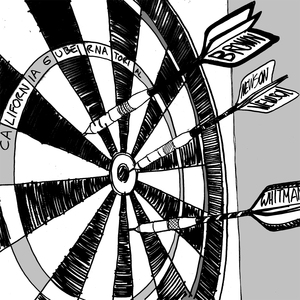State Democrats face formidable roadblocks
There are very few Californians who still approve of Gov. Arnold Schwarzenegger — at least when it comes to politics. That’s why the state’s upcoming gubernatorial race has sparked such a wide range of responses.
Some are excited, hoping for change; others indifferent, knowing that no single person could possibly undo the vast array of problems facing the state.
Either way, last week’s mayoral and gubernatorial elections on the East Coast serve as a barometer for sentiments around the country, showing that, despite California’s strong blue background, the Democratic Party will certainly face many trials in the coming months.
Any potential Democratic candidate will have to fight the country-wide disillusionment with the party, an issue that plagued Virginia and New Jersey in their elections last week. Party fatigue is a common complaint in the months after new leadership moves in, but it will be especially fierce this electoral season if the economy does not improve.
All of the major gubernatorial candidates firmly reinforce the status quo in some respects, coming from backgrounds of high politics or big business. Yet they will be forced to face highly politicized debates, many of which are uniquely Californian in a way that will make this election, once again, one of the most watched around the country.
Jerry Brown, who is widely held to be the strongest Democratic contender, is the popular California attorney general who has already served as state governor in the past. Meanwhile, former eBay CEO Meg Whitman sports a strong lead over every other Republican hopeful, reinforcing the union between big business and politics.
San Francisco Mayor Gavin Newsom was the only aspirant who really came from off the beaten path, but his campaign ended before it even began. While the 2010 ballot has yet to be finalized, his withdrawal from the race shows that, in these troubled times, Californians aren’t willing to take the risk of backing a candidate who hails from a less-than-probable background.
A variety of the campaign issues promise to deal with hot-button topics — not the least of these is the potential of legalized, taxable marijuana.
Marijuana sales could bring in billions of dollars in revenue, but could also create a host of problems, from policing to border policy. An overwhelming 38 percent of Californians are in favor of a legalization measure, which perhaps speaks as much to the state of the economy as it does to Californian counterculture.
Another important point will be the candidates’ position on same-sex marriage. It’s unlikely that any of them will be naive enough to pull a Carrie Prejean (see last year’s Miss America competition), but they will have to tread carefully to avoid alienating themselves from supporters on either side of the gay marriage debate.
Newsom’s image as “just” a same-sex marriage supporter was one of the main reasons for his downfall, which stands as a testament to the fact that either extreme is too extreme for a state as large and diverse as California.
But regardless of their stances on these issues, the main campaign promise for any candidate must surely rest upon the sobering reality of economic policy.
As the state grapples with rising unemployment, it is also forced to deal with falling income taxes. This problem hits harder here than in most states, with income tax making up 55 percent of state revenue.
Candidates will also have to fight hard to convince voters that their particular remedies will actually provide the solution that California so desperately needs.
And then there are the perennial problems of overcrowding in prisons, natural disasters and immigration.
Apart from these local challenges, the candidates will also be dealing with many of the problems that have broken past electoral competitors across the country. For instance, Brown is 71; while Sen. John McCain was admirably sprightly throughout his campaign, no one would hesitate to admit that his age was a compelling factor in his loss last November. Brown will face the same reluctance in the face of a younger opponent.
Only time will tell what scandals or surprises may rock the candidates’ campaigns over the next few months. But more important than these individual issues will be the state of the economy and the new health care bill. These are two highly volatile issues for which no single candidate can provide a solution, but for which they will all certainly be judged. If there’s one thing everyone can agree on, it’s that the Democratic Party has a tough fight ahead of it — even in California.
Rosaleen O’Sullivan is a junior majoring in English and international relations. Her column, “Global Grind,” runs Mondays.

